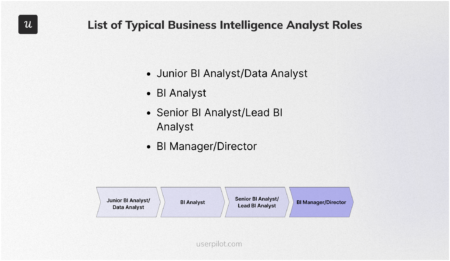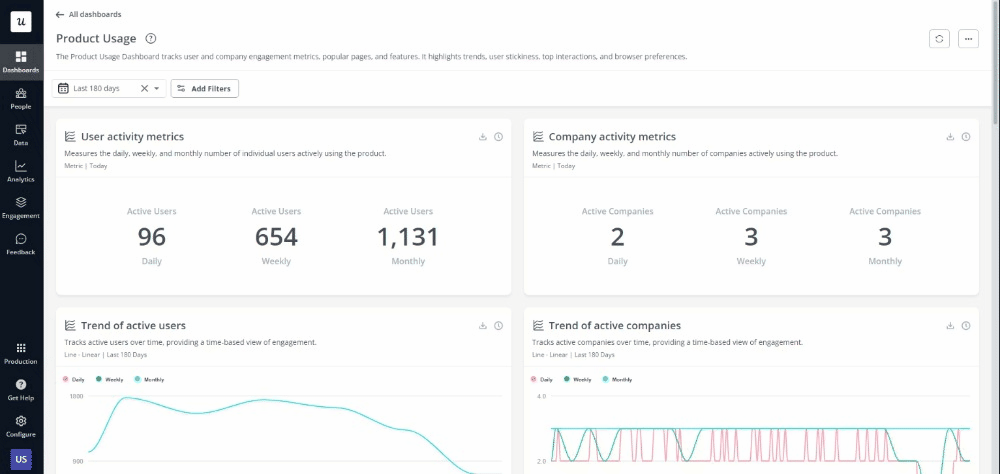![How to Become a Business Intelligence Analyst [+Tools and Resources]](https://blog-static.userpilot.com/blog/wp-content/uploads/2024/07/How-to-Become-a-Business-Intelligence-Analyst-Tools-and-Resources-450x295.png)
Try Userpilot Now
See Why 1,000+ Teams Choose Userpilot

Business intelligence analyst’s main responsibilities
A business intelligence (BI) analyst’s core duties revolve around transforming data into knowledge that fuels better business choices. Here’s a quick rundown of their key tasks:
- Data Acquisition and Sorting: They help gather information from various sources like sales figures, customer surveys, and in-app behavior. This data often needs cleaning and organizing to ensure it’s accurate and usable.
- Data Analysis and Storytelling: Once the data is prepped, they leverage their analytical skills and tools to uncover trends, patterns, and hidden insights. They don’t just crunch numbers; they translate their findings into clear and compelling stories through reports, dashboards, and presentations.
- Strategic Decision Support: Ultimately, such data-driven insights can empower informed business decisions. They provide recommendations for product development, marketing strategies, resource allocation, or customer service improvements.
Business intelligence analyst career path

The career path of a business intelligence analyst is not linear, but there are common stages you can expect as you gain experience and expertise. Here’s a breakdown of the typical career progression:
- Junior BI Analyst/Data Analyst (0-3 Years): At this stage, you’ll typically work under the supervision of senior analysts, assisting with data cleaning, report generation, and basic data analysis.
- BI Analyst (3-5 Years): You’ll take on more responsibility for independent data analysis, report creation, and dashboard development. You’ll likely work closely with business stakeholders to understand their needs and translate them into actionable insights.
- Senior BI Analyst/Lead BI Analyst (5-10+ Years): You’ll lead a team of analysts, oversee complex projects, and develop strategic BI initiatives. You’ll be responsible for ensuring data quality, defining KPIs, and driving data-driven decision-making across the organization.
- BI Manager/Director (10+ Years): You’ll be responsible for overseeing the entire BI function, managing a team of analysts and developers, and setting the overall strategic direction for data-driven initiatives.
As you advance to this position, you can also choose to transition into a data analyst or BI consultant role depending on your interest:
- Data Scientist: If you’re passionate about statistics, machine learning, and predictive modeling, you may transition into a data scientist role.
- BI Consultant: As a consultant, you’ll work with clients to develop and implement BI solutions. This path requires strong business acumen and consulting skills.
How to become a business intelligence analyst?
The path to becoming a business intelligence (BI) analyst is not a one-size-fits-all journey. While a bachelor’s degree in a relevant field like computer science, information systems, or statistics is often preferred, it’s not always a strict requirement. Many successful BI analysts have transitioned from other fields by demonstrating their passion for data and acquiring the necessary skills through alternative routes.
So here’s a road map for your reference:
Educational foundation
- Bachelor’s degree (preferred, but not essential): A degree in computer science, information systems, statistics, mathematics, or a related field provides a strong foundation in data manipulation and analysis. Look for programs that offer courses in database management, SQL, statistics, and data mining.
- Alternative paths: Bootcamps like General Assembly’s Data Science Immersive or online courses from platforms like Coursera (e.g., IBM Data Science Professional Certificate) offer structured learning paths for those without a formal degree.
- Key certifications: Consider the Certified Associate in Analytics (CAA) or the Microsoft Certified: Data Analyst Associate to demonstrate your competency.
Building your technical toolkit
- SQL mastery: Master SQL to query databases and extract the data you need. Practice on platforms like HackerRank or LeetCode.
- Data visualization: Become proficient in BI tools like Tableau or Power BI. Look for tutorials on their official websites or YouTube channels like Alex the Analyst.
- Programming (vptional, but Valuable): Learning Python or R can open doors to advanced data analysis and automation. Consider courses on DataCamp or Codecademy.
- Cloud technologies (bonus): Familiarity with cloud platforms like AWS or Azure can give you an edge in the job market.
Gaining real-world experience
- Internships: Seek internships at companies with established BI teams (e.g., Amazon, Microsoft) to apply your skills in a real-world setting.
- Entry-level roles: Start as a data analyst, junior BI analyst, or reporting analyst to build your foundation. Look for opportunities on job boards like Indeed or LinkedIn.
- Freelancing: Offer your services on platforms like Upwork or Fiverr to gain experience and build your portfolio.
- Personal projects: Analyze publicly available datasets (e.g., from Kaggle) or contribute to open-source BI projects to showcase your abilities.
Networking and community engagement
- LinkedIn: Join BI-related groups and connect with professionals in the field. Share your insights and ask questions.
- Reddit: Participate in discussions on r/businessintelligence to learn from experienced analysts and get career advice.
- Meetups and conferences: Attend industry events to network with potential employers and learn about the latest trends.
Additional tips
- Develop soft skills: Communication, problem-solving, and presentation skills are crucial for success.
- Showcase your work: Build a portfolio of projects demonstrating your skills and share them on GitHub or your website.
What skills should a business intelligence analyst have?
Business intelligence analysts need a unique blend of technical and soft skills to thrive in their roles. Here’s a breakdown of the essential skills:
- Data Warehousing: Understanding how data is structured, stored, and accessed in data warehouses is essential for BI analysts.
- SQL: Proficiency in SQL (Structured Query Language) is crucial for querying and manipulating data from databases.
- ETL (Extract, Transform, Load): BI analysts need to know how to extract data from various sources, transform it into a usable format, and load it into the data warehouse.
- Data Modeling: Understanding data modeling techniques helps BI analysts design effective database structures for analysis.
- Data Visualization Tools – Both No-Code and Low-Code (e.g., Userpilot, Power BI, Tableau): Proficiency in data visualization tools allows analysts to visualize data, create dashboards, and generate reports.
- Programming Languages (e.g., Python, R): Knowledge of programming languages can be helpful for advanced data analysis and automation tasks.
Aside from these technical skills, you’ll also need to practice soft skills like communication, problem-solving, and time management to excel in your role.
Best certifications for business intelligence analysts
While there are numerous certifications available for business intelligence (BI) analysts, not all are equally recognized or relevant. Here are a few that consistently rank highly in terms of necessity and industry recognition:
- Certified Analytics Professional (CAP): This vendor-neutral certification is recognized globally as the premier credential for analytics professionals. It covers the entire analytics lifecycle, demonstrating your expertise in problem-solving, data analysis, and communication of results.
- Microsoft Certified: Power BI Data Analyst Associate: This certification validates your ability to work with Microsoft’s popular Power BI platform, a staple in many BI environments. It demonstrates your skills in data modeling, visualization, and analysis using DAX.
- Certified Business Intelligence Professional (CBIP): Offered by TDWI, a leading BI education provider, this certification covers the core competencies of business intelligence, including data warehousing, data modeling, and reporting. It’s a comprehensive credential that demonstrates your understanding of the field.
- IBM Certified Associate Analyst – Cognos Analytics: This certification demonstrates your ability to utilize IBM Cognos Analytics, a leading BI and performance management platform. It covers areas like data preparation, report authoring, dashboard creation, and data analysis, making it a valuable asset if you work within the IBM ecosystem.
- Oracle Business Intelligence Foundation Suite 11g Certified Implementation Specialist: This certification validates your knowledge and skills in implementing and configuring Oracle Business Intelligence Suite 11g, a comprehensive BI platform. It’s a valuable credential if your organization relies on Oracle BI tools.
Best resources for business intelligence analysts
Here’s a curated list of resources to empower business intelligence analysts at all stages of their careers:
Best books for business intelligence analysts
Here are some of the best books for business intelligence analysts, categorized by learning level:
For Beginners:
- “Data Analytics Made Accessible” by Dr. Anil Maheshwari: This book provides a comprehensive overview of data analytics concepts and techniques, including real-world examples and case studies. It’s suitable for those with little to no prior experience in the field.
- “SQL for Data Analysis: Advanced Techniques for Transforming Data into Insights” by Cathy Tanimura: This book dives into the essential SQL skills needed for data analysis, covering advanced topics like window functions and common table expressions.
For Intermediate Learners:
- “Python for Data Analysis: Data Wrangling with Pandas, NumPy, and IPython” by Wes McKinney: This book is a comprehensive guide to using Python for data analysis, covering essential libraries like Pandas, NumPy, and Matplotlib.
- “R for Data Science: Import, Tidy, Transform, Visualize, and Model Data” by Garrett Grolemund and Hadley Wickham: This book teaches how to use R for data analysis, covering data wrangling, visualization, and basic modeling.
For Advanced Practitioners:
- “Advanced Data Analytics Using Python” by Sayan Mukhopadhyay: This book delves into advanced data analysis techniques using Python, including machine learning, deep learning, and natural language processing.
- “Designing Data-Intensive Applications” by Martin Kleppmann: This book provides a comprehensive overview of designing and building data-intensive applications, covering topics like data storage, processing, and scalability.
Best webinars for business intelligence analysts
Webinars offer a convenient way to gain insights from industry experts, learn about new tools and technologies, and explore emerging trends. For business intelligence analysts, the following webinars are particularly valuable:
- Userpilot: While Userpilot primarily focuses on product analytics and user behavior, their webinars often touch upon broader aspects of business intelligence, particularly how to leverage product data for decision-making. They are an excellent resource for analysts interested in the intersection of data and user experience.
- BrightTALK: This platform hosts a massive selection of webinars on various business intelligence topics, including data warehousing, reporting, dashboards, and advanced analytics. You can easily filter by your interests and level of expertise.
- Gartner Webinars: Gartner, a leading research and advisory company, frequently hosts webinars on the latest trends and best practices in business intelligence and analytics. Their webinars often feature industry experts and thought leaders.
- TDWI (The Data Warehousing Institute): TDWI offers a wealth of resources for BI professionals, including webinars on data architecture, data integration, analytics, and data governance. Their webinars often delve into technical aspects of BI implementation.
Best blogs for business intelligence analysts
Blogs offer a wealth of information, from how-to guides and tutorials to thought leadership pieces and industry news. For business intelligence analysts, these blogs are a must-read:
- Userpilot Blog: Userpilot’s blog is an excellent resource for BI analysts who want to leverage product data for insights. Their articles dive into topics like product analytics, user behavior analysis, and data-driven decision-making, providing actionable advice for improving user experiences and driving business growth.
- Mode Analytics Blog: Mode Analytics is a popular BI platform, and its blog offers in-depth articles and tutorials on data analysis, visualization, and reporting. They also share case studies and examples from real companies, demonstrating how BI is used to solve business problems.
- Tableau Blog: Tableau is a leading data visualization tool, and its blog features a wide range of content, including tutorials, tips, and inspiration for creating impactful dashboards and reports.
- Google Cloud Blog – Looker: Looker, now part of Google Cloud, offers a powerful BI platform for data exploration and analysis. Their blog provides insights into data modeling, advanced analytics, and embedding BI into applications.
Best podcasts for business intelligence analysts
Whether you’re commuting, exercising, or just relaxing, podcasts provide a convenient way to stay updated on the latest developments in the BI world. Here are some of the top podcasts that cater to business intelligence analysts:
- The Data Chief Podcast: Hosted by Cindi Howson, The Data Chief Podcast features interviews with Chief Data Officers (CDOs) and other data leaders from various industries. It covers topics like data governance, data strategy, and the evolving role of data in business.
- Analytics on Fire: This podcast, hosted by BI Brainz, brings together BI leaders and practitioners to share their insights and experiences. The discussions cover a wide range of topics, from data visualization and analytics best practices to the latest trends in BI tools and technologies.
- Data Engineering Podcast: Hosted by Tobias Macey, this podcast focuses on the technical aspects of data engineering. It features interviews with experts in the field, covering topics like data pipelines, data warehouses, cloud infrastructure, and emerging technologies.
- Data Science at Home: Hosted by Francesco Gadaleta, this podcast offers bite-sized episodes on a variety of data science topics. It covers everything from machine learning and artificial intelligence to statistics and data visualization. The episodes are concise and easy to digest, making them perfect for busy BI analysts who want to stay informed.
Best tools for business intelligence analysts
Here’s a breakdown of the top tools for business intelligence analysts, with insights on what each is best for and how it benefits those in this role:
- Userpilot – Best for understanding user behavior within your product: Userpilot’s comprehensive analytics tools enable BI analysts to track user journeys, identify patterns in behavior, and uncover insights that can inform product development and marketing strategies.
- Tableau – Best for data visualization and creating interactive dashboards: Tableau’s intuitive drag-and-drop interface empowers BI analysts to transform complex datasets into visually compelling stories.
- Power BI – Best for data analysis, reporting, and dashboard creation within the Microsoft ecosystem: Power BI’s seamless integration with other Microsoft tools like Excel and Azure makes it a powerful choice for BI analysts working within the Microsoft ecosystem.
- Amplitude – Best for product analytics and tracking user behavior across different platforms: Amplitude provides in-depth analytics on user interactions with web and mobile applications.
- Mixpanel – Best for analyzing user behavior and tracking events within digital products: Mixpanel allows BI analysts to track user actions, measure the impact of product changes, and segment users based on their behavior.
- Heap – Best for auto-capturing user interactions and analyzing the entire customer journey: Heap automatically collects data on every user interaction, eliminating the need for manual event tracking.
- ChurnZero – Best for identifying and addressing churn risks proactively: ChurnZero utilizes machine learning algorithms to predict customer churn.
- Google Charts – Best for creating simple and interactive charts for web applications: Google Charts offers a straightforward way to embed charts and graphs directly into web pages or reports.
Business intelligence analyst FAQs
What does a business intelligence analyst do?
Business intelligence (BI) analysts are the data detectives of an organization. They collect, analyze, and interpret complex data sets to uncover meaningful insights that drive informed decision-making.
Does a business intelligence analyst need coding?
While not all BI analyst roles require extensive coding, having some programming skills can be a significant advantage. Basic knowledge of SQL (Structured Query Language) is often necessary for querying databases and manipulating data. Additionally, familiarity with languages like Python or R can be beneficial for more advanced analysis and automation tasks.
What is the role of a BA in business intelligence?
Business analysts (BAs) play a crucial role in bridging the gap between IT and business within the BI process. They work closely with stakeholders to understand their business problems and translate them into actionable data requirements. BAs also collaborate with BI analysts to ensure that the data analysis and visualization align with business objectives and provide meaningful insights for decision-making.
What is an AI business intelligence analyst?
An AI business intelligence analyst leverages artificial intelligence and machine learning techniques to enhance BI processes. They build and deploy AI models to automate data analysis, identify hidden patterns, and generate predictive insights. AI BI analysts also work on integrating AI capabilities into BI tools and platforms.
Conclusion
Becoming a successful business intelligence analyst requires dedication, continuous learning, and a proactive approach to developing relevant skills.
By following the outlined steps and leveraging the resources available, you can effectively navigate your career path and achieve your professional goals.
We hope this guide has provided you with valuable insights and practical advice to help you on your journey to becoming a proficient and impactful business intelligence analyst!
Looking into tools for business intelligence analysts? Userpilot is an all-in-one product platform with engagement features and powerful analytics capabilities. Book a demo to see it in action!








